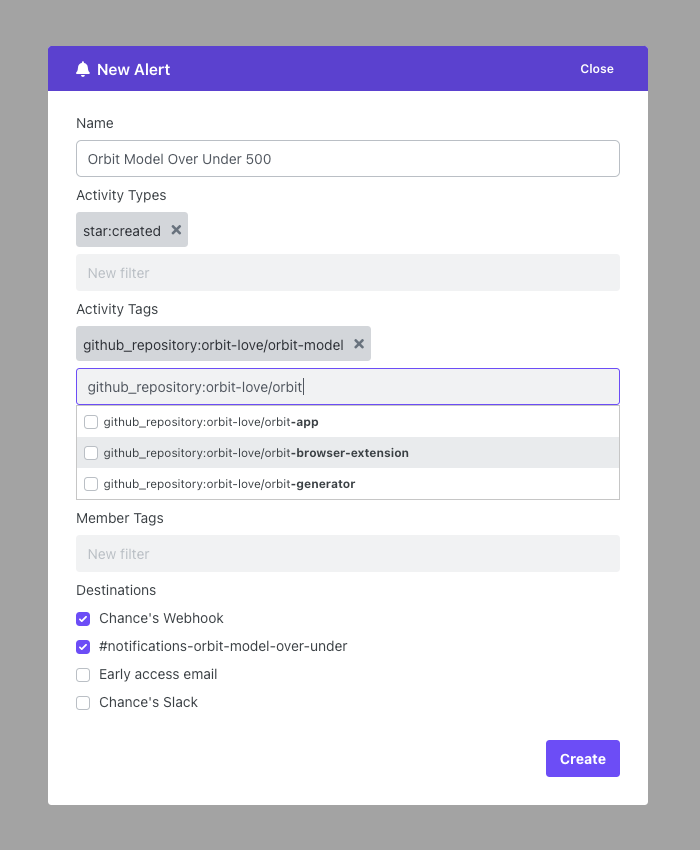Forecasting 500 GitHub stars
A scientific wild guess to making predictions of the future.

Chance Feick
March 12, 2021
We’re approaching a big milestone here at Orbit: 500 stars of our open source framework for building communities.
There’s certainly some debate around whether stars are vanity metrics, however it's undeniably key in gaining visibility into communities for open source maintainers.
Here’s our (mostly) data-driven approach to predicting when we’ll hit 500 stars on GitHub.
Over/Under
For a friendly competition, we gave our community members the first opportunity to guess when we’ll hit the milestone. The prize is a $25 gift card for coffee, on us! ☕️
After collecting our community’s votes, Patrick turned the question around on the engineering team and asked us for our predictions.
He was probably expecting off the cuff responses. Except, we had a distinct advantage. We could use data to help better inform our answer. 🤔
Baseline Predictions
We’re a bunch of product engineers at Orbit, not exactly quants or scientists. We currently lack the resources of forecasting models and data analysis, so we decided to see if we could just use our existing product to provide a guesstimate to the question:
What’s the over/under on when we hit 500 stars?
First, we needed to establish a baseline to determine how many stars we currently have, then when we predict stars will exceed 500. We had two tools available in our toolbox: visualizations and notifications.
Visualizations
Reports in Orbit allow us to track and measure activity across multiple channels. We can visualize activities filtered by channel, group, and type. We were able to quickly determine the all time number of GitHub stars for our repo:

Now we have enough data to establish a baseline. We see that stars have been recently increasing at a rate of approximately 65 stars a month. If all goes according to plan, then we should expect to hit the milestone sometime within the next month or so.
Certain Things Have Come to Light
Except, things rarely go according to plan! We noticed that stars started to double in December 2020. Turns out, that’s exactly when we announced our seed funding. It’s a safe assumption that external events like fundraising, or even viral blog posts can cause an acceleration in stars. How does that affect our predictions?
Philip E. Tetlock, author of “Superforecasting” believes that an open-mind is key to making better predictions. The best forecasters are always willing to change and update their predictions.
We’re open-minded folks here at Orbit. We just needed to know when we should change our predictions.
Notifications
Alerts in Orbit allow us to create customized alerts with filters and tags to receive notifications whenever a new activity is created. We can customize the trigger to ping us in Slack whenever there’s a new star for our repo:

Now we can be immediately alerted when there’s an uptick in stargazers. We’ll use this new information to appropriately adjust our predictions on the fly.
Is That Your Final Answer?
Thankfully our employees are disqualified from the “Over/Under 500” challenge. If we had to answer based on the information available to us right now though, we’d predict we’ll hit 500 stars on April 5th, 2021.*
* We will totally change our answer if our Slack channel starts blowing up
This has been a fun exercise at our attempt to forecast GitHub stars with a scientific wild guess. Next time, it might just be easier to build milestones like “nth type of activity type” into the product. We’ll be sure to update this post when we hit 500 to let you know if our prediction was accurate.
Interested in using Orbit to build Orbit? We’re hiring!
You might also like:
- Why Orbit is Better Than Funnel for Developer Relations
- DevRel teams need tools and models created specifically for our discipline, and not just those adopted from other fields.
- Slack vs Discord vs Discourse: The best tool for your community
- An in-depth comparison of 3 top community platforms across dozens of factors.
- How we use Orbit to build Orbit
- A guide to how we use our product to build our community.

